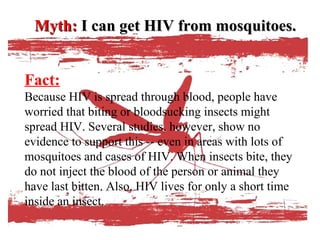Hiv ppt
- 1. Made by - Yash Maurya IX B
- 2. WWhhaatt IIss HHIIVV?? âĒ Human immunodeficiency virus (HIV) is a type of virus called a retrovirus, which infects the human immune system (the system in the body which is in charge of fighting off illness). âĒ HIV may cause AIDS (a collection of diseases and symptoms, or problems in the body) by eventually killing the white blood cells, which a healthy body uses to fight off disease.
- 3. MMyytthh :: GGeettttiinngg HHIIVV//AAIIDDSS iiss aa ddeeaatthh sseenntteennccee.. Fact: ïAlthough HIV/AIDS has no cure, it can be treated. There has been tremendous progress in treatment for HIV over the years. A person living with HIV/AIDS can now continue to live a strong and productive life for many years.
- 4. MMyytthh:: II ccaann ggeett HHIIVV ffrroomm mmoossqquuiittooeess.. Fact: Because HIV is spread through blood, people have worried that biting or bloodsucking insects might spread HIV. Several studies, however, show no evidence to support this -- even in areas with lots of mosquitoes and cases of HIV. When insects bite, they do not inject the blood of the person or animal they have last bitten. Also, HIV lives for only a short time inside an insect.
- 5. MMyytthh :: HHIIVV ccaann bbee sspprreeaadd dduurriinngg ccoonnttaacctt wwiitthh ssaalliivvaa,, ssuucchh aass tthhee sshhaarriinngg ooff uutteennssiillss.. Fact: HIV may be found in saliva, but it is in too small in amount to infect anyone.
- 6. MMyytthh :: HHIIVV iiss tthhee ssaammee aass AAIIDDSS.. Fact: HIV is the virus that leads to AIDS. A person is said to have AIDS when his or her CD4 count drops below 200 or when he or she has certain infections or cancers. A person can have HIV for years without having AIDS. Having HIV does not mean you have AIDS.







